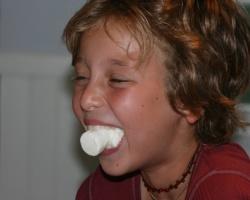A psychologist who found he could predict children’s prospects by testing whether they could resist eating a marshmallow is to scan their brains to find the neurological roots of temptation. (Story continues below.)
Discussion Starters:
1.) Knowing there are links and differences in childhood and adult behavior, what merit do you think Dr. Mischel’s data holds?
2.) Understanding all humans are tempted — and that individual vices vary based on the person — how valid and helpful might this research be?
3.) A few Scripture passages dealing with temptation include:
The “marshmallow test,” one of the world’s simplest and most successful behavioural experiments, was developed by Professor Walter Mischel.
He proved conclusively that the longer a 4-year-old was able to wait before taking a sweet, the better were his or her chances of a happy and successful life.
Mischel has been monitoring the lives of dozens of his subjects since he started the marshmallow experiments at a nursery on the campus of Stanford University, California, in the 1960s.
His findings have proved so compelling that 40 of his original subjects, now in their 40s, are preparing to undergo scans in the hope of answering a perplexing human question: Why are some of us better than others at resisting temptation?
“Brain imaging provides a very exciting and important new tool,” said Mischel, who now works at Columbia University in New York.
By examining the differences between the brains of subjects who turned out to be good at controlling their impulses and those who wolfed down the marshmallow the moment it was offered, researchers hope to come up with new ways of teaching the benefits of delayed gratification.




